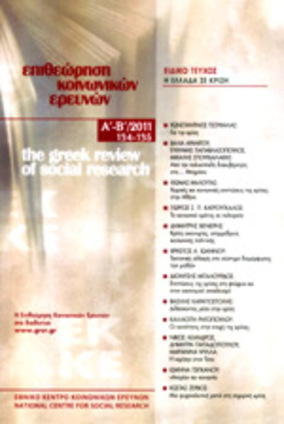Approaching Twitter sociologically : a case study of the public humiliation of HIV-positive women
Part of : Επιθεώρηση κοινωνικών ερευνών ; Vol.144, 2015, pages 103-128
Issue:
Pages:
103-128
Section Title:
Articles
Abstract:
The present study examines the online discussion on Twitter regarding the stigmatization of HIV-positive women in Athens in May 2012. The method of critical discourse analysis is applied on the anti-sovereign discourses that were articulated on Twitter, while the incident was taking place. The virtual countersphere is analyzed with regards to its political implications, such as the reproduction of the unfree sovereign discourse and the mobilization towards political action.
Subject:
Subject (LC):
Keywords:
gender, nation, sexuality, anti-dominant discourses, public sphere(s), social media
Electronic Resources:
References (1):
- Ausserhofer, J. and Maireder, A. (2013). National politics on Twitter: Structures and topics of a networked public sphere. Information, Communication & Society, 16(3), 291-314. Berger, P. L. and Luckman, T. (1991) The Social Construction of Reality: A Treatise in the Sociology of Knowledge. London: Penguin Books. Bruns, A. and Burgess, J. E. (2012). Researching news discussion on Twitter: New methodologies. Journalism Studies, 13, 1-13. Bruns, A. (2011). How long is a tweet? Mapping dynamic conversation networks on Twitter using GAWK and GEPHI. Information, Communication & Society, 15(9), 1323-1351. Bruns, A. (2010). Oblique strategies for ambient journalism. M/C Journal, 13(2), Retrieved from: http://journal.media-culture.org.au/index.php/mcjournal/article/viewArticle/230/0 Butler, J. (1993). Bodies that matter: On the discursive limits of «sex». New York: Routledge. Dahlgren, P. (2005). The Internet, public spheres, and political communication: Dispersion and deliberation. Political Communication, 22, 147-162. Fairclough, N. (2001). Media discourse. London: Arnold. Fairclough, N. and Wodak, R. (1997). Critical discourse analysis. In T. A. van Dijk (ed.), Discourse as Social Interaction. Discourse Studies: A Multidisciplinary Introduction. Volume 2 (pp. 258-284). London: Sage Publications. Foucault, M. (1991). The microphysics of power. Athens: Ipsilon [In Greek]. Fraser, N. (2007). Transnationalizing the public sphere: On the legitimacy and efficacy of public opinion in a post-westphalian world. Retrieved from: http://eipcp.net/transversal/0605/ fraser/en Fraser, N. (1990). Rethinking the public sphere: A contribution to the critique of actually existing democracy. Social Text, 25/26, 56-80. Halkias, A. (2011). Gendered Violences: power, discourse, subjectivities. Athens: Alexandreia [In Greek]. Halkias, A. (2004). The empty cradle of democracy: Sex, abortion and nationalism in modern Greece. Durham-London: Duke University Press. Hermida, A. (2010a). From TV to Twitter: How ambient news became ambient journalism. M/C Journal, 13(2). [Online] Retrieved from: http://journal.media-culture.org.au/index.php/mcjournal/article/viewArticle/220 Larsson, A. O. and Hallvard, M. (2012). Studying political microblogging: Twitter users in the 2010 Swedish election campaign. New Media Society, 14, 729-747. Mayer, T. (2000). Gender ironies of nationalism: setting the stage. In T. Mayer (ed.). Gender ironies of nationalism: Sexing the nation (pp. 1-22). London: Routledge. Mostov, J. (2000). Sexing the nation/ desexing the body: politics of national identity in the former Yugoslavia. In T. Mayer (Ed.). Gender ironies of nationalism: Sexing the nation (pp. 89-110). London: Routledge. Papacharissi, Z., and Oliveira, M. (2012). Affective news and networked publics: The rhythms of news storytelling on #Egypt. Journal of Communication: 1-17. Papacharissi, Z. (2002). The virtual sphere: The internet as a public sphere. New Media Society, 4(9), 9–27. Penney, J. and Dadas, C. (2014). (Re)Tweeting in the service of protest: Digital composition and circulation in the Occupy Wall Street movement. New Media Society, 16, 74-90. Phillips, L. and Jorgensen, M. W. (2002). Discourse analysis as theory and method. London: Sage Publications. Sioula-Georgoulea, I. (2013). The public humiliation of HIV-positive women: a study of the productive technology of power in five (5) greek news websites (Master thesis, Panteion University of Social and Political Sciences, Athens, Greece). Retrieved from: http://pandemos.panteion.gr/index.php?op=record&type=0&q=σιούλα&page=1&scope=0&lang=el &pid=iid:7150 [In Greek] Vergeer, M., Hermans L. and Sams, S. (2013). Online social networks and micro-blogging in political campaigning: The exploration of a new campaign tool and a new campaign style. Party Politics, 19(3), 477-501. Vergeer, M. and Hermans, L. (2013). Campaigning on Twitter: Microblogging and Online Social Networking as Campaign Tools in the 2010 General Elections in the Netherlands. Journal of Computer-Mediated Communication, 18, 399-419.




